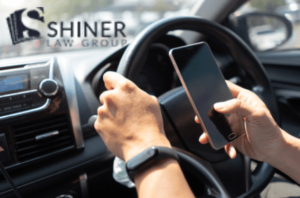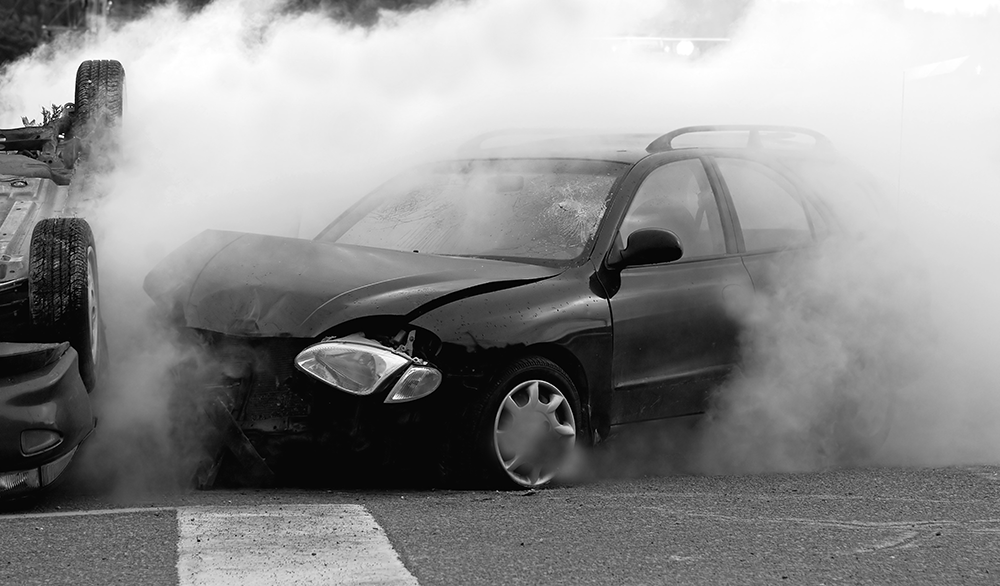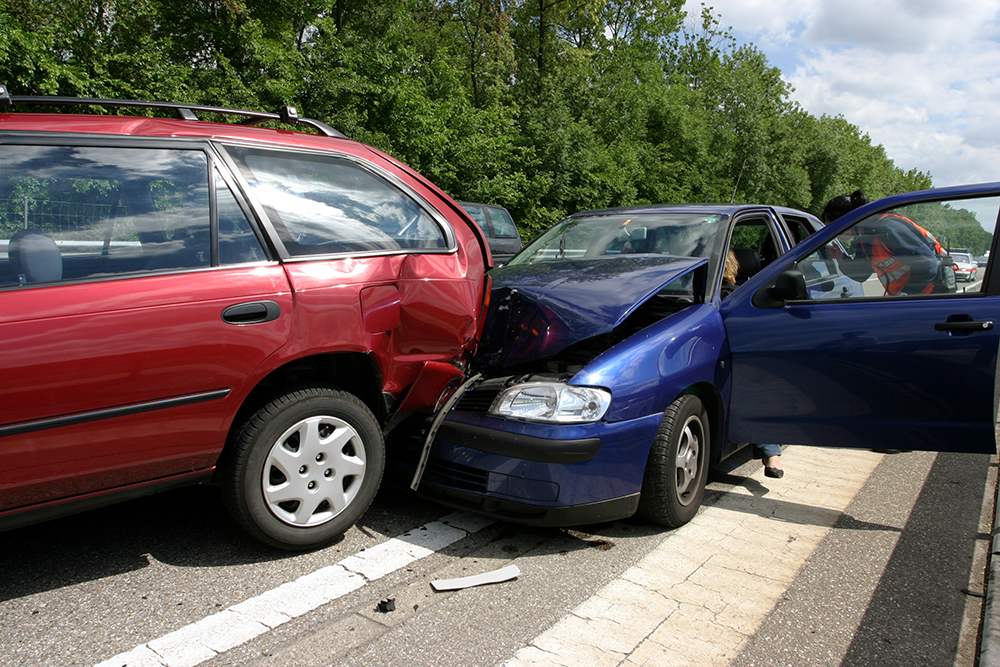Florida Law Bans Texting-and-Driving
 It is obvious that more and more people driving on Florida roads today are more distracted than ever, not by the kids in the back seat or the radio, but by their cell phones by texting and driving, searching the internet, or accessing social media. With Facebook, Instagram, Snapchat, and instant messaging becoming the more common forms of communication, drivers seem to not be able to put their phones down for less than five minutes to concentrate on the road ahead. Sadly, almost every day we travel to and from work we see distracted drivers looking down at their mobile phones and not on the road.
It is obvious that more and more people driving on Florida roads today are more distracted than ever, not by the kids in the back seat or the radio, but by their cell phones by texting and driving, searching the internet, or accessing social media. With Facebook, Instagram, Snapchat, and instant messaging becoming the more common forms of communication, drivers seem to not be able to put their phones down for less than five minutes to concentrate on the road ahead. Sadly, almost every day we travel to and from work we see distracted drivers looking down at their mobile phones and not on the road.
As a result of the proliferation of distracted driving Florida state legislators in Tallahassee are focusing on common sense driving laws to help keep our roads safe, however, it is up to us, the drivers, to also be active in trying to keep ourselves and others around us safe. In fact, there are now free applications you can download on your phone to help avoid texting and driving, these drive safety type apps to block the ability to receive phone calls and texts while driving and will send messages to the caller or texter that you cannot answer the phone or text back because you are driving. If you are easily distracted by text messages, you may want to consider downloading one of these free apps. For instance, on many occasions, I have texted friends and immediately received responses advising that those friends are driving and cannot respond – these types of new aspects involving text messaging may have already helped avoid a number of accidents with injuries and even death.
The Wireless Communications While Driving Law, Section 316.305 of the Florida Statutes prohibits drivers to from texting and driving, surfing on the web, responding to Facebook messages etc. In essence, the law states that a person cannot manually type or enter letters, numbers or symbols into a wireless device (text, email, and Instant message) while operating a motor vehicle. The law was passed July 1, 2019. Additionally, the law states that a person operating a motor vehicle may not use a handheld communications device in a school or work zone, which means a person can not be holding their phone while driving in certain areas.
Distracted driving, including texting and driving, claimed over 3,000 lives in the United States in 2019, according to the National Highway Traffic and Safety Administration. According to the Florida Crash Dashboard data indicates that between January 2020 and 2020 there were a total of 340,939 crashes in the state of Florida which resulted in 3,340 fatalities, and this was during the pandemic when work-related and vacation travel was down.
Florida State Representative Emily Solsberg is seeking to expand on this new law by introducing a bill to require operators of a motor vehicle to go completely hands-free while driving. Florida bill 91 would make it illegal for people to operate vehicles while “manually holding or otherwise touching” a wireless device. Ms. Slosberg stated that “Cell phones are the number one source of distraction for drivers…we must do more to limit distracted driving and keep our roadways safe.”
Additionally, according to the National Highway Traffic and Safety Administration (“NHTSA”) which said that driving a vehicle while texting is six times more dangerous than driving while drunk or under the influence. While both drivings under the influence and texting and driving are poor choices, this statistic details the changes in driving behaviors over the last few years.
What is the definition of Distracted Driving?
Distracted driving is generally defined as when an operator of a motor vehicle takes their eyes off the road or their “mind off driving”, which means the operator is daydreaming, thinking of something else besides concentrating on the road ahead, not paying attention to their surroundings, or is preoccupied with something else as opposed to driving, such as their cell phone. This negligent behavior puts yourself and others at risk. A driver may look down at the radio or take their hands off the wheel to change a channel and that is considered distracted driving. In fact, this is why many automobile companies now manufacture cars and trucks that allow the driver to change the radio or access other functions while keeping their hands on the steering wheel.
Also, the driver of the vehicle may drop something in their lap or on the floor, take their hands off the wheel to retrieve it and that is considered distracted driving. Talking or tending to children in the back seat is also extremely distracting and takes both your eyes as well as your mind off the road while driving. However, the two most prevalent forms of distracted driving are eating while driving or talking, texting, or surfing the internet on a handheld communication device. Texting requires all three dangerous behaviors mentioned above, making this one of the most dangerous distractions.
How can you successfully avoid a crash?
To successfully avoid a crash a driver must be aware of what is going on around their vehicle, they must be able to perceive road hazards and be able to react to these hazards in time. By focusing on the road rather than your radio, GPS, kids in the back, food, or even your text messages you have a better ability to concentrate on the obstacles around you and react quickly to changes in the road conditions. And, it is important to never search the internet or access social media apps while driving – in some cases this is seen as more dangerous than drinking and driving.
The best ways to avoid a traffic citation
Avoiding getting pulled over by law enforcement and getting a traffic ticket is a very good motivator to follow the new Florida texting and driving law, however, reasonable drivers understand the biggest motivator is avoiding a traffic accident and hospitalization. By doing the following three safety measures will help ensure a safer drive for everyone, including other drivers around you.
- Finish your business before getting behind the wheel, send that last email, or text message, sign off of your social media accounts and turn on your safety driving app such as Drive-mode, which prevents texts and calls from coming to your phone while you are driving.
- Put your cell phone away which will prevent you from reaching it or looking down at it while driving, even if you have the safety app installed and operating, you still may be tempted to reach for your phone, check the latest news, or tweet on Twitter, by placing your phone out of the way and out of reach will help prevent that.
- Refrain from eating or drinking while on the road, like texting, eating, and drinking takes your hands off the wheel, your eyes off the road, and forces you to think of eating or drinking rather than driving.
- Stay focused on the road ahead.
What does the Florida texting and driving ban mean for you? Know your rights!
The texting and driving law only applies to the operator of a vehicle when the car is moving, if you are stopped at a light or stuck in a traffic jam then based on the language of the bill you are permitted to text, send emails dial numbers, etc. however this is not recommended and highly frowned upon. If a police officer observes you driving while texting or surfing the web, they can pull you over and issue a traffic citation, previously they were only able to issue you a citation for texting a driving if they had pulled you over for another driving offense, such as speeding or swerving.
The only exceptions to the new rule are if you are a first responder and actively engaged in performing your duties or if you are an average citizen reporting an emergency or a crime or receiving emergency broadcasts or updates. While you may be pulled over for texting and driving, law enforcement can not search your phone records without your permission. Law enforcement must first obtain a search warrant in order to view your phone history. However, you should be aware that those records can be obtained as evidence if the crash resulted in death or serious bodily injury. Additionally, even if you do not consent to a search of your phone, law enforcement can still give you a traffic citation and you will either be forced to pay the fine or contest the ticket in court.
Can you sue for damages if you have been injured by a distracted driver?
Yes, however, Florida’s no-fault driving laws forces the victim to prove fault on the other party which means you must prove the other party was negligent at the time of the accident and their negligence caused the crash. If you do bring a lawsuit against another person who was negligent and caused a crash, you can also seek discovery to determine whether that careless driver was distracted at the time. Although this is not a simple process, it is possible and it is best to hire a qualified personal injury lawyer to get the evidence needed to prove these issues in court.
What is negligence driving in the State of Florida?
To prove negligence, your attorney needs to show that the at-fault party was driving while and breached their duty, this can also be proven if the driver was distracted or in a dangerous state. This process requires our firm to gather evidence, which will help point to the negligence of the at-fault party, meaning that injuries sustained in a traffic crash were the direct results of the negligence of the driver of the other vehicle. In addition, to prove negligence in the state of Florida someone must prove that the at-fault party had a duty, that that person breached their duty, that as a result of the breach the injured party sustained damages, and that the breach of duty was the proximate cause for those damages.
The burden of proof requires that we gather evidence such as police reports, medical records, pictures and videos of the accident scenes, witnesses testimony, and in cases involving the suspicion that the driver may have been distracted we will collect phone records, which include texting, calls, internet sites visited anything which may help to prove the driver was on the phone at the time of the crash. Our office will subpoena these records in order to help prove our case.
What is a subpoena?
A subpoena is a legal document issued to compel testimony or to produce evidence. It is an integral part of the legal process and can be essential to winning a lawsuit. The Florida personal injury lawyers at Shiner Law Group will often subpoena phone records to prove a negligent driver was on his phone at the time of the crash, this will prove that the driver was negligent, for they knew or should have known the laws about texting and driving or being distracted when driving. Other subpoenas we will issue would be for the defendants’ social media records as well as their web access. In requesting these records related to the at-fault party’s activity on their cell phones will help establish that the crash was a result of a distracted driver.
Subpoenas are just one way to obtain this information, a plaintiff in a lawsuit can also conduct other discoveries such as serving interrogatories and requests for production to get a hold of a defendant’s cell phone records, text messages, and social media activity for the time period during the accident. Thus, we will encompass a complete view of the activities of the driver at the time of the accident, was the driver texting, surfing the web, visiting Facebook at the time of the crash, this will help prove the driver acted recklessly and was negligent.
Four Elements to prove Negligence
- Duty of care – The at-fault party has a legal responsibility to adhere to the standard of care while on the road, thus the driver is expected to operate their vehicle safely and obey all traffic laws.
- Breach of Duty – the driver failed to adhere to the standard of care detailed above, or the driver was unable to operate the vehicle correctly, causing the traffic crash to occur, in the case above, the driver had a duty of care to not text and drive and the driver breached that duty by texting and driving.
- Causation – the traffic crash resulted in the injuries and damages sustained, meaning if your injuries were caused by falling off a ladder the day before the traffic crash then there is no causation, however, if it can be proven that the injuries sustained could have only been caused by the crash then you have been able to prove causation.
- Damages – a totality of all losses associated with the crash would be considered damages, this includes, damages to your vehicle and other property, hospital and medical expenses, lost wages and other documented damages as well as the non-economic damages such as emotional and physical trauma (pain and suffering).
Gross negligence (recklessness) vs negligence when it comes to distracted drivers – is there a difference?
What is the difference between negligence and gross negligence? In a negligence case, there is a proven carelessness, a mistake, or inattention which resulted in injury to another party, however, in a gross negligence case, there is a proven deliberate act or a reckless disregard for the safety of others.
As an example, in an ordinary negligence case you may have a driver who runs a stop sign and causes a crash and injuries. However, in a gross negligence case, you have a driver speeding in a dense population center which causes a crash and injuries. The driver was deliberate in their actions or had extreme carelessness while driving which caused the accident. Gross negligence will also be applied when a person is texting and driving or surfing the web while driving because they knew or should have known this action was dangerous and against the law. In short, these types of activities can be akin to drinking and driving or driving under the influence.
Can you obtain punitive damages if a driver is found to have been texting and driving?

Car Accident Attorney, David Shiner
What are punitive damages? Punitive damages are awarded in certain circumstances when gross negligence can be proven, the purpose of punitive damages is to deter others from destructive behaviors.
If we can prove that the at-fault driver, was texting and driving or on the Facebook or another social media platform at the time of the crash we have proven gross negligence and thus punitive damages can be applied.
Call our office today!
If you have suffered severe injuries which resulted in bodily harm and are interested in seeking compensation for your damages, call the law offices of Shiner Law Group today to speak to one of our personal injury attorneys. As your dedicated attorney understands the dangers of distracted driving, we specialize in representing victims who have suffered losses as a result of someone else’s negligence. Contact us today to learn more!


